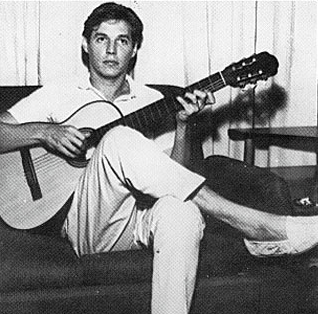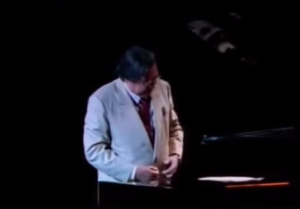Antonio Carlos Jobim was more than just a musician – he was a visionary who brought the rhythms and melodies of Brazil to the world. He was a man of many loves, from his family and friends to the beauty of nature and the simple pleasures of life. But perhaps most importantly, he left behind a lasting legacy that continues to inspire generations of musicians and music lovers around the globe. In this post, we’ll take a closer look at the life and loves of this musical icon, and explore the rich tapestry of his legacy that has touched so many lives.
Antonio Carlos Jobim Awards
- 1964 – Grammy Award for Best New Artist
- 1967 – Grammy Award for Best Male Pop Vocal Performance
- 1995 – Grammy Award for Best Latin Jazz Album
- 2002 – DownBeat Jazz Hall of Fame
- 2011 – Grammy Lifetime Achievement Award
- 2014 – Latin Songwriters Hall of Fame
- 2015 – Billboard named The 30 Most Influential Latin Artists of All Time
- 2015 – IAU named a crater on the planet Mercury was named in his honor
- 2016 – The official mascot of the Summer Paralympics in Rio de Janeiro, Tom, was named after him
Quotes about Antonio Carlos Jobim
“Working with my good friend, Jobim, was an absolute joy. We were raised in different countries, but we share the same deep love and respect for great talent … musicians, lyricists, composers and fellow singers.” – Frank Sinatra
“Tom Jobim was the soul of Brazilian music.” – Caetano Veloso
“He was a genius, a poet, a master of harmony and melody.” – Sting
“Jobim was the father of bossa nova, the king of melody, the poet of love.” – João Gilberto
“He was a musician of the highest order, a true innovator and a master of his craft.” – Herbie Hancock
“Jobim was a true original, a pioneer who brought the sounds of Brazil to the world.” – Quincy Jones
“His music was like a warm embrace, a celebration of life and love.” – Ella Fitzgerald
“Jobim was one of the greatest composers of the 20th century, a true legend who left an indelible mark on the world of music.” – Carlos Santana
Antonio Carlos Jobim’s Personal Life: Triumphs and Tragedies of a Musical Genius
Antonio Carlos Jobim Personal Life – Jobim was a musical genius, known for his timeless compositions that captured the essence of Brazil’s culture and its people. However, beyond his music, Jobim’s personal life was also filled with triumphs and tragedies that influenced his art and legacy. In this article, we will uncover Jobim’s personal story and explore the events that shaped his life and music.
Early Life and Career
Jobim, a Brazilian musician, is affectionately known as Tom by many of his friends in Brazil and abroad. He was born in Rio de Janeiro to educated and cultured parents, including his father Jorge, who was a diplomat and professor, and his mother Nilza Brasileirc de Almeida, who founded and ran a primary school that Jobim and his sister Helena attended.
Tom’s early exposure to music came from his two guitar-playing uncles. At the age of 14, he began to seriously study music and continued to work on theory and composition for several years, even though he briefly considered becoming an architect. Tom was heavily influenced by American swing music, particularly the sounds of big bands such as Tommy Dorsey, Duke Ellington, Count Basie, and Woody Herman, which were still very popular during the late 1940s when he was starting to refine his musical skills.
Tom’s exposure to the jazz scene in Rio’s nightclubs during the 1940s and 1950s greatly influenced his music, which included symphonies and his own compositions. By the early 1950s, he was already writing his own music and honing his skills in music composition. It was in the late 1950s that he gained international recognition with his work on the album “Chega de Saudade” by João Gilberto.
Triumphs and Successes
Throughout the 1960s, Jobim became a prominent figure in the Brazilian music scene, working with other legendary musicians such as João Gilberto and Stan Getz. He wrote many of his most famous songs during this time, including “Garota de Ipanema” (Girl from Ipanema), “Corcovado,” and “Desafinado.” His unique blend of samba, bossa nova, and jazz became known as the “Jobim Sound” and earned him worldwide acclaim.
Tragedies and Losses
Despite his musical success, Jobim’s personal life was marked by tragedy and loss. He suffered from alcoholism, which affected his health and relationships. In 1974, he lost his wife, Ana Lontra, to cancer, and in 1994, his son, Paulo, died in a plane crash. These losses deeply affected Jobim and influenced his later compositions.
Legacy and Influence
Antonio Carlos Jobim’s music has left a lasting impact on Brazilian and global music. His songs have been covered by countless artists, and his influence can be heard in the works of contemporary musicians. In addition to his musical legacy, Jobim’s personal story serves as a reminder that even the most successful and celebrated artists are human and face their own personal struggles.
Jobim and Sinatra: A Collaboration That Changed Music History
In the history of music, there are few collaborations that have had as much impact as that between Antonio Carlos Jobim and Frank Sinatra. The collaboration between these two musical giants was a groundbreaking event that changed the course of music history forever.
When Jobim and Sinatra collaborated, they created something truly special. Their first album, Francis Albert Sinatra & Antonio Carlos Jobim, was released in 1967 and featured a collection of songs that blended the best of Brazilian music and American jazz. The album was a critical and commercial success and helped bring Bossa Nova to a wider audience.
The second album produced by the collaboration, Sinatra/Jobim Sessions, was released in 1979 and included a mix of new and previously released songs. Once again, the album was a success and cemented the collaboration as one of the most important in music history. Some of the standout songs from the collaboration include “The Girl from Ipanema,” “Corcovado,” and “Wave.” These songs perfectly captured the essence of both Jobim’s Brazilian roots and Sinatra’s American jazz sensibilities, creating a sound that was both unique and timeless.
The impact of the collaboration between Jobim and Sinatra can still be felt today. The blend of Brazilian rhythms and American jazz that they created has inspired countless musicians and genres, and their influence can be heard in everything from contemporary pop to modern jazz.
In conclusion, the collaboration between Antonio Carlos Jobim and Frank Sinatra was a true turning point in the history of music. Their unique sound helped bring Bossa Nova to the mainstream and inspired countless musicians and genres. Today, their music continues to inspire and captivate audiences around the world, cementing their place in music history as two of the greatest musical talents of all time.
The Women of Jobim’s Music: A Celebration of His Collaborations with Female Artists
Antonio Carlos Jobim is known for his groundbreaking contributions to Brazilian music and Bossa Nova. However, what is often overlooked is the role of the female artists who collaborated with him, and who helped shape the sound of Brazilian music.
One of Jobim’s most memorable collaborations was with Elis Regina. Together, they created the album “Elis & Tom,” which is now considered a classic of Brazilian music. The album features songs such as “Águas de Março,” which is still widely played today. Jobim’s collaboration with Regina helped cement her status as one of Brazil’s greatest singers and composers, and it helped introduce Jobim’s music to a wider audience.
Another important collaborator for Jobim was Astrud Gilberto, who sang on several of his most famous songs, including “The Girl from Ipanema.” Together, they recorded the album “The Astrud Gilberto Album,” which became a hit around the world. The album helped establish Jobim’s music as truly international, and it helped create a bridge between Brazilian and American music.
Jobim also collaborated with Gal Costa on the album “Gal Costa Canta Tom Jobim.” The album features Costa’s interpretation of some of Jobim’s most famous songs, including “Desafinado.” Costa’s voice perfectly captures the sensuality and playfulness of Jobim’s music, creating a sound that is both alluring and sophisticated.
Another important collaborator for Jobim was Nara Leão. Together, they created the album “Nara,” which features some of Jobim’s most beloved songs, such as “Diz que Fui por Aí.” Leão’s soft and gentle voice perfectly complements Jobim’s music, creating a sound that is both soothing and melancholic.
Joyce Moreno was another important collaborator for Jobim. Together, they created the album “Tudo,” which features some of Jobim’s most complex and experimental compositions, such as “Chega de Saudade.” Moreno’s voice and guitar playing perfectly capture the intricate rhythms and harmonies of Jobim’s music, creating a sound that is both virtuosic and soulful.
In conclusion, the female artists who collaborated with Antonio Carlos Jobim played a crucial role in shaping the sound of Brazilian music and Bossa Nova. From Elis Regina to Astrud Gilberto, these women brought a unique perspective and sensibility to Jobim’s music, creating a sound that was both sophisticated and alluring. Today, their music continues to inspire and captivate audiences around the world, cementing their place in music history as some of the greatest collaborators of all time.
This page is sponsored by Sacramento Top 10, your spot for the best restaurants, attorneys and more.
From Grammy to Academy: The Incredible Awards Journey of Antonio Carlos Jobim
Antonio Carlos Jobim Awards – Jobim was an incredibly talented musician who made a name for himself in the world of music. He won numerous awards throughout his career, including Grammy Awards and Academy Awards. Let’s take a look at his incredible awards journey and how he became one of the most celebrated musicians of his time.
Jobim’s awards journey began in 1965 when he won his first Grammy Award for the album “Getz/Gilberto”, which featured his iconic song “The Girl from Ipanema”. This album went on to win four Grammy Awards in total, including “Album of the Year”. This was just the beginning of Jobim’s success, as he went on to win a total of nine Grammy Awards throughout his career.
- 1965: Best World Music Album for “Getz/Gilberto”
- 1965: Record of the Year for “The Girl from Ipanema” with Stan Getz and Astrud Gilberto
- 1965: Album of the Year for “Getz/Gilberto”
- 1970: Best Instrumental Arrangement Accompanying Vocalist(s) for “The Look of Love”
- 1977: Best Jazz Fusion Performance for “Urubu”
- 1980: Best Jazz Fusion Performance for “Terra Brasilis”
- 1986: Best Jazz Fusion Performance for “Passarim”
- 1995: Best World Music Album for “Antonio Brasileiro”
- 1995: Best Instrumental Arrangement Accompanying Vocalist(s) for “Wave” with Herbie Hancock and the London Symphony Orchestra
Jobim’s Grammy wins cemented his legacy as one of the greatest composers and musicians of all time. His influence can still be heard in countless songs and styles of music today.
In addition to his Grammy Awards, Jobim also won two Latin Grammy Awards in 2000 for his album “Antonio Brasileiro”. This album was a testament to his incredible talent and showcased his skills as a songwriter and performer.
Jobim also made a significant impact on the film industry, winning two Academy Awards for his contributions. His first Academy Award came in 1965 for the song “The Girl from Ipanema” featured in the film “Get Yourself a College Girl”. He won his second Academy Award in 1970 for the song “Theme from The Adventurers”. These awards were a testament to his incredible talent as a composer and songwriter.
In 1991, Jobin was inducted into the Songwiters Hall of Fame, followed up posthumous induction into the Latin Songwriters Hall of Fame in 2014.
Jobim won numerous Downbeat awards throughout his career, including “Best Album” for “Wave” in 1967 and “Best Composer” in 1970 and culminating in induction of the Downbeat Hall of Fame in 2002.
In 1965, Jobim also received the Edison Award (Dutch music awards similar to the Grammys) for his album “Getz/Gilberto”.
He was also awarded the Brazilian Order of Cultural Merit in 1992, one of the highest honors in Brazil for contributions to culture.
Jobim’s incredible awards journey was a testament to his talent and his impact on the music industry. He will always be remembered as one of the greatest musicians of all time and his legacy will continue to inspire generations of musicians to come.
FAQ – Frequently Asked Questions about Antonio Carlos Jobim
Antonio Carlos Jobim won a total of nine Grammy Awards throughout his career, including Album of the Year for “Getz/Gilberto” in 1965, which featured “The Girl from Ipanema.”
- 1965: Best World Music Album for “Getz/Gilberto”
- 1965: Record of the Year for “The Girl from Ipanema” with Stan Getz and Astrud Gilberto
- 1965: Album of the Year for “Getz/Gilberto”
- 1970: Best Instrumental Arrangement Accompanying Vocalist(s) for “The Look of Love”
- 1977: Best Jazz Fusion Performance for “Urubu”
- 1980: Best Jazz Fusion Performance for “Terra Brasilis”
- 1986: Best Jazz Fusion Performance for “Passarim”
- 1995: Best World Music Album for “Antonio Brasileiro”
- 1995: Best Instrumental Arrangement Accompanying Vocalist(s) for “Wave” with Herbie Hancock and the London Symphony Orchestra
More on Antonio Carlos Jobim
This Jazz Inspiration Profile is sponsored by Sacramento Top 10 the best local list of professional services, restaurants, contractors, real estate and more.
Antonio Carlos Jobim Famous Songs
“Ela é Carioca” (1956) She’s a Carioca
“Chega de Saudade” (1958) No More Blues
“Desafinado” (1958) Off-Key
“Modinha” (1958) Gentle Tunes
“Caminhos Cruzados” (1958) Crossed Paths
“Canção Do Amor Demais” (1958) Song of Love
“Brigas Nunca Mais” (1959) Never More
“Se Todos Fossem Iguais a Você” (1959) Someone to Light Up My Life
“Eu Sei Que Vou Te Amar” (1959) I Know I Will Love You
“Samba de Uma Nota Só” (1959) One Note Samba
“Corcovado” (1960) Quiet Nights of Quiet Stars
“O Amor Em Paz” (1960) Once I Loved
“O Grande Amor” (1960) The Great Love
“A Felicidade” (1960) Happiness
“Insensatez” (1961) How Insensitive
“Lamento” (1962) The Great Love
“Garota de Ipanema” (1962) Girl from Ipanema
“Só Danço Samba” (1962) I Only Dance Samba
“Meditação” (1963) Meditation
“Samba do Avião” (1963) Song of the Jet
“Inútil Paisagem” (1963) If You Never Come To Me
“Agua De Beber” (1963) Water To Drink
“Meditação” (1963) Meditation
“Por Causa de Você” (1963) Don’t Ever Go Away
“Chora Tua Tristeza” (1963) Cry Your Sadness
“Outra Vez” (1964) Once Again
“Só Tinha de Ser Com Você” (1964) It Only Had To Be With You
“Por Toda a Minha Vida” (1964) For All My Life
“Inútil Paisagem” (1964) If You Never Come to Me
“Só Saudade” (1964) Only Nostalgia
“Pra Machucar Meu Coração” (1964) To Hurt My Heart
“Bonita” (1965)
“Eu Preciso De Você” (1965) I Need You
“Pra Dizer Adeus” (1966) To Say Goodbye
“Wave” (1967)
“Triste” (1967) Sadness
“Retrato Em Branco E Preto” (1968) Zingaro
“Chovendo na Roseira” (1970) Double Rainbow
“Olha pro Céu” (1971) Look to the Sky
“Cheio de Saudade” (1972) Full of Longing
“Ligia” (1972)
“Águas de Março” (1972) Waters of March
“Gabriela” (1975)
“Saudade Do Brasil” (1976) Longing for Brazil
“Anos Dourados” (1986) Looks Like December
“Samba do Soho” (1987)
“Anjo De Mim” (1994) My Guardian Angel
![]()







